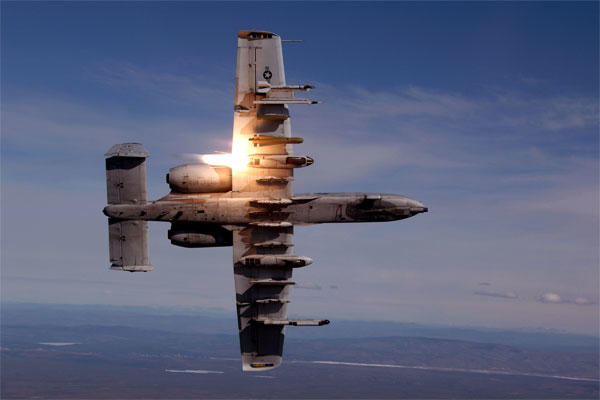The U.S. Army has no interest in taking over the Air Force's fleet of A-10 attack planes, even if it would save the venerable Cold War-era aircraft from the bone yard.
The service's top civilian, Army Secretary John McHugh, rejected the idea of accepting hand-me-down A-10 Warthogs from the Air Force.
"No chance," he said during a breakfast meeting with reporters on Wednesday in Washington, D.C. "That's not even been a topic of casual conversation."
"With our own aircraft fleet we're taking some pretty dramatic steps to reconfigure and become more affordable, and the A-10 mission is not something we considered. That's an Air Force mission as it should be and I'm sure the Air Force feels the same way," McHugh said.
Meanwhile, on Capitol Hill, Air Force Secretary Deborah Lee James defended the service's renewed budget proposal to begin retiring its fleet of almost 300 Warthogs -- even as pilots fly the gunship in the Middle East to attack militants affiliated with the Islamic State in Iraq and Syria.
Over the past decade-plus of war in Iraq and Afghanistan, James said, "the A-10 has done a magnificent job, but so has the F-16 and the F-15E, and the B-1 bomber has been a contributor and there have been a number of aircraft that have contributed to the totality of close-air support. So to me, close-air support is not a plane, it's a mission."
James made those comments during a Senate Appropriations Defense Subcommittee hearing after Sen. Roy Blunt, R-Missouri, asked her to respond to officials such as Army Chief of Staff Gen. Raymond Odierno who have praised the Warthog's performance in close-air support missions.
The aircraft, known officially as the Thunderbolt II, packs a 30mm, seven-barrel Gatling gun, called the GAU-8 Avenger, which is configured to 3,900 rounds per minute. Pilots and ground troops alike appreciate the low, slow-flying aircraft for its high rate of fire and ability to decimate ground targets.
"We do it with the greatest of reluctance. It's a budgetary matter," James said of the recommendation to retire the plane. "Every aircraft eventually gives way to the next generation."
If lawmakers approve the Air Force's budget request for fiscal 2016, which begins Oct. 1, the service would divest the A-10 over a period of five years and save an estimated $4 billion during that period.
Congress blocked the service's previous budget request to retire the aircraft, but allowed it to move as many 36 of the planes to back-up status. The shift will free up more maintainers to work on the F-35 Joint Strike Fighter, the Pentagon's most expensive acquisition program.
Air Force Chief of Staff Gen. Mark Welsh, who testified alongside James, has made similar comments in the past. He has said the push to retire the Warthog is being driven by automatic budget cuts known as sequestration.
The across-the-board spending reductions were agreed to by the White House and Congress in 2011 as part of deficit-reduction legislation known as the Budget Control Act. The cuts are due to return in fiscal 2016 with greater effect unless lawmakers agree on an alternative plan.
Separately, Sen. Kelly Ayotte, R-New Hampshire, whose husband flew the A-10 and who was part of a group of lawmakers that fought last year to protect funding for the aircraft, reportedly sent a letter to James this week asking for an update into the investigation of Maj. Gen. James Post.
Post, vice commander of Air Combat Command, reportedly warned officers last month: "Anyone who is passing information to Congress about A-10 capabilities is committing treason."
--Michael Hoffman contributed to this report.
-- Brendan McGarry can be reached at brendan.mcgarry@military.com




























